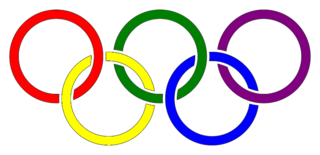Related Research Articles

The Winter Olympic Games, also known as the Winter Olympics, is a major international multi-sport event held once every four years for sports practiced on snow and ice. The first Winter Olympic Games, the 1924 Winter Olympics, were held in Chamonix, France. The modern Olympic Games were inspired by the ancient Olympic Games, which were held in Olympia, Greece, from 776 BCE to 394 CE. The Baron Pierre de Coubertin of France founded the International Olympic Committee (IOC) 1,500 years later in 1894, leading to the first modern Summer Olympic Games in Athens, Greece in 1896. The IOC is the governing body of the Olympic Movement, with the Olympic Charter defining its structure and authority. The original five Winter Olympic Sports were bobsleigh, curling, ice hockey, Nordic skiing, and skating. The Games were held every four years from 1924 to 1936, interrupted in 1940 and 1944 by World War II, and resumed in 1948. Until 1992, the Summer Olympic Games and the Winter Olympic Games were held in the same year. A decision to change this was made in 1986, when during the 91st International Olympic Committee session, IOC members decided to alternate the Summer Olympic Games and the Winter Olympic Games on separate four-year cycles in even-numbered years. Also, at that same congress it was decided that 1992 Winter Olympics would be the last to be held in the same year as the Summer Games and that to change the rotation, the games that would be held in 1996 would be brought forward by two years, being scheduled to 1994. After those games, the next were to be held in 1998 when the four-year Olympic Cycle resumed.

Renate Titzia Groenewold is a Dutch former long track speed skater and road bicycle racer.

Eric Arthur Heiden is an American physician and a former long track speed skater, road cyclist and track cyclist. He won an unprecedented five individual gold medals, and set four Olympic records and one world record at the 1980 Winter Olympic Games. Heiden was the most successful athlete at those Olympic Games, single-handedly winning more gold medals than all nations except for the Soviet Union (10) and East Germany (9). He is the most successful Winter Olympian from a single edition of any Winter Olympics. He delivered the Athlete's Oath at those same 1980 Games. His coach was Dianne Holum.

Clara Hughes, is a Canadian cyclist and speed skater who has won multiple Olympic medals in both sports. Hughes won two bronze in the 1996 Summer Olympics and four medals over the course of three Winter Olympics.

Australia first competed in the Winter Olympic Games in 1936 in Garmisch-Partenkirchen, and has participated in every games since, with the exception of the 1948 Games in St. Moritz.

Cindy Klassen, is a Canadian retired long track speed skater. She is a six-time medallist having achieved one gold, two silver, three bronze at the Winter Olympics.

Canada has competed at every Winter Olympic Games, and has won at least one medal each time. By total medals, the country's best performance was in the 2018 Winter Olympic Games where Canadian athletes won 29 medals. Canada set a new record for most gold medals won by a country in a single Winter Olympics with 14 at the 2010 Winter Olympics in Vancouver, Canada. This achievement surpassed the previous record of 13 gold medals held by the Soviet Union (1976) and Norway (2002). Both Germany and Norway matched the record total of 14 gold medals in Pyeongchang in 2018. This record has since been surpassed by Norway with 16 at the 2022 Winter Olympics.

New Zealand society is generally accepting of lesbian, gay, bisexual, transgender and queer (LGBTQ) peoples. The LGBTQ-friendly environment is epitomised by the fact that there are several members of Parliament who belong to the LGBTQ community, LGBTQ rights are protected by the Human Rights Act, and same-sex couples are able to marry as of 2013. Sex between men was decriminalised in 1986. New Zealand has an active LGBTQ community, with well-attended annual gay pride festivals in most cities.

Matthew John Mitcham OAM is an Australian retired diver and trampolinist. As a diver, he was the 2008 Olympic champion in the 10m platform, and he is the 2nd highest single-dive score in Olympic history. This made him the first openly gay athlete to win an Olympic gold medal. He is also the first Australian male to win an Olympic gold medal in diving since Dick Eve at the 1924 Summer Olympics.
Olivier Jean is a three time Olympian who represented Canada in both short and long track speed skating. Olivier Jean is a gold medalist from the Vancouver 2010 Olympic Games in the men's 5000m relay. He is a Canadian short track speed skater, racing internationally from 2002 to 2015 and switched to long track speed skating, competing internationally from 2015 to 2018. Olivier competed at his second Olympic Games in Sochi 2014 in short track speed skating, and for his third game appearance, switched to long track speed skating, competing in the mass start at the 2018 Pyeongchang Olympic Games. His appearance is well known for his dreadlocks and for listening to reggae, which he says makes him skate faster.
During the Parade of Nations at the 2010 Winter Olympics opening ceremony, held beginning at 6:00 PM PST on February 12, 2010, 82 athletes bearing the flags of their respective nations led their national delegations as they paraded into BC Place Stadium in the host city of Vancouver, British Columbia, Canada.

Anastasia Bucsis is a Canadian former speed skater. She competed at the 2010 Winter Olympics in Vancouver in the women's 500-metre competition. In addition, she participated in the Sochi 2014 Winter Olympics for women's long track, placing 27th in the 500 metres. She now is a sportscaster and personality for CBC. Bucsis lives in Toronto, and is a passionate advocate for mental health issues, eradicating homophobia in sport, and telling the stories of athletes.

Pride House is a dedicated temporary location which plays host to lesbian, gay, bisexual and transgender (LGBT) athletes, volunteers and visitors attending the Olympics, Paralympics or other international sporting event in the host city. The first was organized for the Vancouver 2010 Winter Olympics.
There were many controversies and concerns affecting the 2014 Winter Olympics. There were disputes with Circassians, who demanded the events be cancelled or moved unless Russia apologized for the 19th century Circassian genocide, environmental and economic issues, lack of political stability and governance, and the safety and human rights of LGBT athletes and journalists, in light of Russia's "gay propaganda" laws, which sparked Olympic-focused protests. However, all of these events were overshadowed by the massive Russian state-sponsored doping program uncovered in the aftermath of the Games.

Athletes and artists who identify as lesbian, gay, bisexual, transgender, pansexual, non-binary, queer, and/or intersex, and/or who have openly been in a same-sex relationship (LGBTQI+) have competed in the Olympic and Paralympic Games, either openly, or having come out some time afterward.

The Principle Six campaign, also Principle 6, or P6, was launched in January 2014 as an Olympic protests of Russian anti-gay laws in conjunction with the 2014 Winter Olympics being held in Sochi, Russia. Principle 6 refers to the sixth principle of the Olympic Charter that says any form of discrimination "is incompatible with belonging to the Olympic Movement."
Any form of discrimination with regard to a country or a person on grounds of race, religion, politics, gender or otherwise is incompatible with belonging to the Olympic Movement.
References
- ↑ "Beijing World Cup". Archived from the original on 3 December 2008.
- ↑ "Vancouver 2010 Profile". Archived from the original on 8 April 2010.
- ↑ "Blake Skjellerup struggles with skating pace". New Zealand Press Association. Stuff.co.nz. 22 February 2010. Retrieved 9 May 2010.
- ↑ "About Blake". BlakeSkjellerup.com. 2011. Archived from the original on 29 December 2011. Retrieved 15 January 2012.
- ↑ "Send out gay speed skater Blake Skjellerup to the World Cup and Olympics". indiegogo.com. 2013. Retrieved 26 August 2013.
- 1 2 Zacharias, Yvonne (2 August 2010). "New Zealand Olympian Blake Skjellerup embraces coming out". Vancouver Sun. Archived from the original on 29 October 2018. Retrieved 26 February 2012.
- ↑ "Kiwi Olympian reveals he is gay". New Zealand Press Association. Television New Zealand. 6 May 2010. Archived from the original on 9 May 2010. Retrieved 9 May 2010.
- ↑ Buzinski, Jim (5 May 2010). "New Zealand Olympian comes out". Out Sports. Archived from the original on 24 January 2012. Retrieved 15 January 2012.
- ↑ Hernandez, Greg (28 June 2011). "Gay Olympians Matthew Mitcham and Blake Skjellerup named an ambassadors to 2014 Out Games". Greg in Hollywood. Retrieved 15 January 2012.
- ↑ "Gay New Zealand Olympian Speed Skater Blake Skjellerup Launches Anti-Bullying Campaign". Towleroad. 5 April 2011. Retrieved 31 March 2012.
- ↑ "‘To Russia With Love’: Can Johnny Weir Save Russia’s Gays?". Daily Beast , 29 October 2014.
- ↑ "Exclusive: Blake Skjellerup Talks About His Husband, His Hawaii Wedding, And How Marriage Equality Is Changing The World".
- ↑ Hinzmann, Dennis (29 July 2015). "Blake Skjellerup Shares Wedding Photos on Instagram". Out.